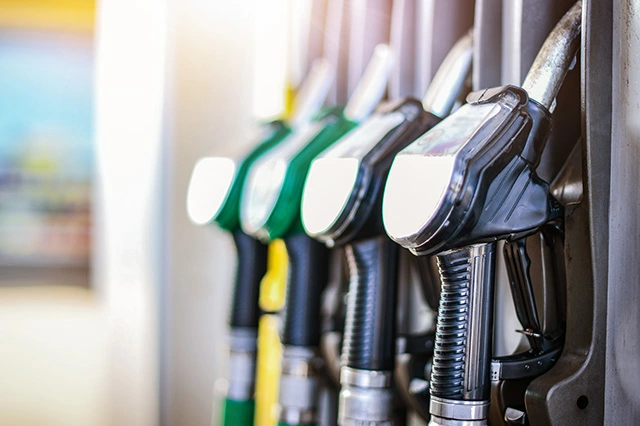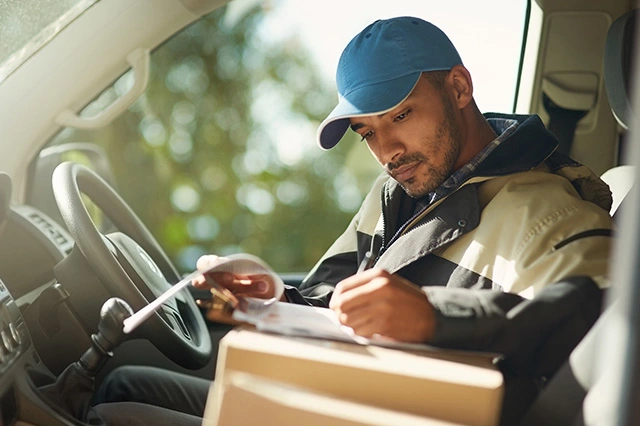What is Courier Insurance?
Courier insurance is a specialist type of insurance designed to protect individuals or businesses that work in the courier and delivery industry. You will be able to select the types of protection you want such as liability insurance, vehicle insurance and goods in transit cover. Additionally, having appropriate courier cover, including third party, comprehensive, and third party fire and theft, is essential to legally operate and manage risks associated with delivering goods.
Generally though, a policy consists of two key areas:
- Courier liability insurance: The covers damage or injury to other people or their property as a result of the courier’s business activities.
- Vehicle insurance: This covers damage to the courier’s vehicle, whether it is a car, courier van, or truck.
- Goods in transit insurance: This covers the goods being transported during delivery and provides compensation if they are lost, stolen, or damaged in transit.
Insurance for couriers is legally required and helps to protect against potential financial losses resulting from accidents or other incidents that may occur during the delivery process. It is important to carefully review and select the appropriate cover for your specific business needs and to regularly review and update your policy as needed.
How our process works
We’ve worked hard to refine our process and keep it as quick, easy and simple as possible for our customers.
What Is Included With Courier Insurance?
In the UK, the minimum legal cover for vehicles on the road is TPO or third party only insurance. For most businesses, more cover is required. The courier insurance cost can be influenced by factors such as driving history, coverage area, and the nature of the goods carried, and it typically costs more than standard vehicle insurance due to the higher risks involved.
At a fundamental level, you must decide whether you prefer:
- Third-party only cover – This covers any harm caused to other individuals or their property in the event of an accident. However, it doesn’t provide any coverage for your vehicle or the driver.
- Third-party, fire, and theft – This involves third-party only cover and also compensates you if your van is stolen or damaged due to fire.
- Comprehensive cover – This is the most comprehensive level of protection you can obtain for your vehicle. It comprises third-party, fire, and theft cover and will also pay for repairs to your own vehicle in the event of an accident, even if you are at fault.
Add Ons For Courier Insurance
Does Courier Insurance Cover The Vehicle’s Contents?
If you’re wondering whether courier insurance covers the contents of your vehicle, the answer depends on the type of insurance policy and level of cover you have. If you opt for carriage of goods for hire and reward, then your policy should cover the items you’re delivering. Courier van insurance work by financially protecting users while transporting goods, but coverage levels can vary and often do not include protection for the contents of the van, pointing out the need for additional coverage options like goods in transit insurance. However, if you don’t have this cover, the items may not be insured, leaving you responsible for any damage or theft.
To ensure that you’re reimbursed for the costs of lost merchandise in the event of an accident involving the courier vehicle, it’s important to carefully review your policy details and include the appropriate cover. Our agents will be able to connect you with specialist brokers who will talk you through what the insurers offer.
If you’re carrying tools and materials that belong to you and are used for work purposes, you’ll need a type of insurance called carriage of own goods. This may not be necessary if you work solely as a courier, but it’s worth considering if you have a second job and keep equipment in your van. For example, if you’re a builder and use your van to transport tools, it’s worth speaking to your insurer about covering these items as well.
If you only need to insure the good you carry and not the vehicle, then you should consider goods in transit insurance.
Who Needs Courier Insurance?
Courier insurance is necessary for individuals or businesses that work in the courier and delivery industry. This includes couriers, delivery drivers, and businesses that transport goods as part of their operations. It is especially important for those using cars in the courier industry to have courier car insurance due to the unique coverage requirements.
If you use your vehicle to deliver goods and parcels, whether it’s a car, van, scooter, or motorbike, you need parcel delivery insurance. This type of insurance takes into account the extra miles you drive and the value of the items you’re carrying.
Without appropriate cover, your vehicle and the goods you’re transporting may not be insured, leaving you unprotected if something goes wrong, such as an accident or theft. This includes self-employed drivers needing self-employed courier insurance.
You should note that a standard van insurance policy will not cover you for courier work as the risk imposed is different. If you intend to operate as a courier, you will need this specific type of policy.
Do I Need Courier Insurance?
If you’re a self-employed courier or run a courier business, having courier insurance is essential to protect yourself and your business from unexpected risks. Courier insurance provides an extra layer of reassurance, covering unexpected expenses such as employee claims or disrupted schedules. Public liability insurance is a key component, protecting you against third-party property damage or injury claims.
On the other hand, transit insurance covers the items being transported, ensuring you’re compensated if goods are lost, stolen, or damaged during delivery. By securing the right insurance, you can focus on your deliveries with peace of mind, knowing you’re protected against potential financial setbacks.
Compare Courier Insurance Quotes
We know how difficult comparing policies can be. That’s why our trained team are here to help you find dedicated brokers who want to quote you.
Our service is free and impartial with no obligation to buy. You can easily buy courier van insurance through our comparison service, ensuring you get tailored coverage options based on your specific needs.
What Is The Difference Between Courier and Haulage Insurance?
Courier and haulage insurance are both types of commercial vehicle policy. The primary difference is the style of business operation.
A courier policy is designed for businesses that use their vehicles to make multiple deliveries of goods and parcels. This type of insurance takes into account the extra miles driven, the value of the items being carried, and the fact that courier vehicles are more likely to be driving through busy residential areas. When comparing costs, strategies to reduce expenses for courier van insurance can also apply to car insurance, making it crucial to shop around for the best deals and policies before renewing.
Haulage policies are designed for businesses that make one or two big deliveries, typically over long distances. This type of insurance is aimed at long distance lorry drivers who transport goods over hundreds of miles.
Frequently Asked Questions
Related News
The Benefits of Using Premium Fuel Over Regular Fuel
In the UK, motorists are presented with a variety of choices when it comes to fuelling their vehicles, with premium fuels being a common option. While standard fuel may appear more cost-effective at first
Opportunities to Be a Self-Employed Courier
The rise of e-commerce, coupled with an increasing demand for fast, reliable delivery services, has made the courier industry in the UK an attractive option for those looking to work independently. Becoming a self-employed
Couriers v Delivery Drivers, What’s The Difference?
In the bustling logistics and transportation sector of the UK, the roles of couriers and delivery drivers are essential. Despite their similarities, they are distinct in various ways, from job responsibilities and required skills





